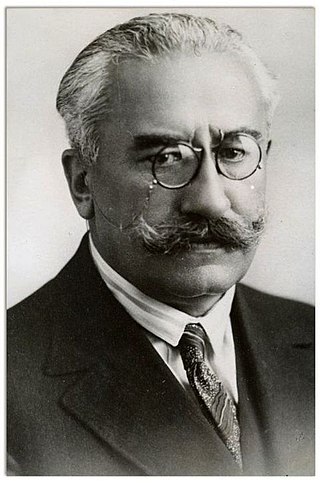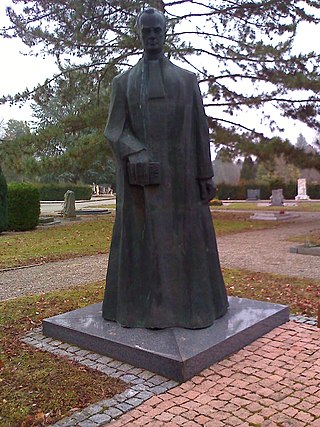
Iuliu Maniu was a Romanian lawyer and politician. He was a leader of the National Party of Transylvania and Banat before and after World War I, playing an important role in the Union of Transylvania with Romania.

Alexandru Vaida-Voevod or Vaida-Voievod was an Austro-Hungarian-born Romanian politician who was a supporter and promoter of the union of Transylvania with the Romanian Old Kingdom. He later served as 28th Prime Minister of Romania.

GheorghePop de Băsești, also known under the nickname Badea Gheorghe or Badea George, was an Imperial Austrian-born Romanian politician, philanthropist and patriot, who served as vice president (1881–1902) and president (1902–1919) of the Romanian National Party at a time when Transylvania was part of the Kingdom of Hungary within Austria-Hungary, and eventually as the president of the Great National Assembly of Alba Iulia that declared the Union of Transylvania with Romania on 1 December 1918.

George Bariț, was an ethnic Romanian Austro-Hungarian historian, philologist, playwright, politician, businessman and journalist, the founder of the Romanian language press in Transylvania.
The Peasants' Party was a political party in post-World War I Romania that espoused a left-wing ideology partly connected with Agrarianism and Populism, and aimed to represent the interests of the Romanian peasantry. Through many of its leaders, the party was connected with Poporanism, a cultural and political trend in turn influenced by Narodnik ideas. In 1926, it united with the Romanian National Party to form the National Peasants' Party (PNȚ).
The Romanian National Party, initially known as the Romanian National Party in Transylvania and Banat, was a political party which was initially designed to offer ethnic representation to Romanians in the Kingdom of Hungary, the Transleithanian half of Austria-Hungary, and especially to those in Transylvania and Banat. After the end of World War I, it became one of the main parties in Romania, and formed the government with Alexandru Vaida-Voevod between November 1919 and March 1920.

Vasile Lucaciu was a Romanian Greek-Catholic priest and an advocate of equal rights of Romanians with the Hungarians in Transylvania.

Vasile Goldiș was a Romanian politician, social theorist, and member of the Romanian Academy.

Aurel Constantin Popovici was an ethnic Romanian Austro-Hungarian lawyer and politician.

The Blaj Pronouncement is an 1868 document that expresses the reaction of its Transylvanian Romanian backers to the Austro-Hungarian Compromise of 1867, which established a dual monarchy in Austria-Hungary. Drafted with input from a number of Romanian intellectuals, at the initiative of Ioan Rațiu and George Barițiu, the Pronouncement was presented at Blaj on 3/15 May during a popular assembly, attended by some 60,000 peasants from throughout Transylvania, commemorating the 20th anniversary of its 1848 predecessor. It was a political declaration against the Hungarian system of government that did away with Transylvania's long-standing autonomy. It reaffirmed the principles and objectives outlined in the National petition of 1848 and called for the autonomy of Transylvania, the reopening of the Diet on the basis of proportional representation and the recognition of laws approved by the Diet of Hermannstadt (Sibiu) (1863–64), which recognised the rights of the Romanian nation, including that of proportional representation. It specified that Romanians did not recognise the Parliament of Hungary or its right to make laws for Transylvania.

Alimpiu Barbuloviciu was the Vicar Forane of the Greek Catholic Vicariate of Șimleu Silvaniei (1873–1913) and the head of the branch of Astra in Sălaj County.

The Romanian Volunteer Corps in Russia, or Volunteer Corps of Transylvanians-Bukovinians, was a military formation of World War I, created from ethnic Romanian prisoners of war held by Russia. Officially established in February 1917, it comprised abjurers of the Austro-Hungarian Army, mainly contingents from Transylvania and Bukovina. These had been obliged to fight against Romania, and, once in Russian custody, volunteered for service against the Central Powers. As campaigners for self-determination and union with Romania, they passed political resolutions which, in both tone and scope, announced those adopted on Union Day 1918.
Rubin Patiția was an Austro-Hungarian ethnic Romanian lawyer and political activist. A native of the Transylvania region, he trained as a lawyer, settling in Alba Iulia in the 1870s and using his position to advance the local Romanian community. Patiția achieved prominence as a signatory of the Transylvanian Memorandum in 1892, an act that eventually led Patiția to spend time in prison. Soon after 1900, he began to withdraw from politics, dying near the close of World War I, shortly before the union of Transylvania with Romania.

Nicolae Cristea was an Austro-Hungarian ethnic Romanian Orthodox priest, professor, journalist and political activist. A protégé of Andrei Șaguna, he studied in Germany before returning to edit the church's newspaper for nearly two decades, a period during which he also taught at the theological seminary in Sibiu. He was politically active, a stance that culminated in the early 1890s with his signing of the Transylvanian Memorandum and subsequent imprisonment.
Aurel Suciu was an Austro-Hungarian ethnic Romanian lawyer and political activist.
Iuliu Coroianu was an Imperial Austrian-born Romanian lawyer and activist.

Dimitrie Comșa was an Imperial Austrian-born Romanian agronomist and political activist.

Ștefan Cicio Pop was a Romanian politician.

Ioan Ciordaș was an Austro-Hungarian-born Romanian lawyer and activist.
















